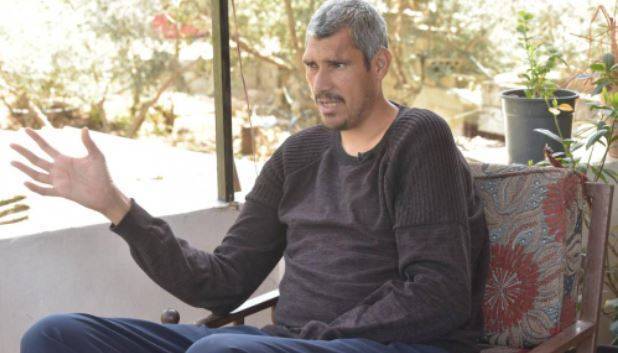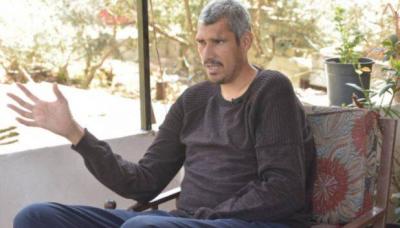To mock someone who is "tall" and to laugh at them heartily while recalling proverbs about height and shortness is the height of folly from any "human" toward a person who did not choose to be tall or short. Mustafa Awad Ibrahim, from Akkar, sits alone within four walls, away from prying eyes, suffering silently from his height, health, age, and the bullying that follows him like a shadow, often repeating: people are relentless.
There is no dispute over the saying: "Everything that exceeds its limit turns against it." It is a popular proverb. However, for some reason, the "blessings" from heaven are perceived as "strange and extraordinary" by those who do not look beyond their noses, indifferent to feelings and sensitivities, or to God's will, which is above all. Mustafa, born in the village of Beit Younes in Akkar's mountainous area, currently resides in Barqa'il, a name derived from Syriac meaning "God's lightning."
There, in one of the alleys of this Akkarian village, eyes shine and well up with tears due to the suffering of a man whose height is "much taller than the door." Standing at 2.35 meters and at the age of forty-two, his home door, located in a long corridor strewn with houses, is always shut. Nearby goats, chickens, and the crowing of roosters seem to have no end. Twenty steps lead us to the home of "Abu Al-Tul" as he is called in Akkar. Upon entering, we find him sprawled on a bed much larger than any in the neighborhood. It is a bed he commissioned to be made at 2.50 meters long since his growth only stopped two years ago, at age forty.
Abu Al-Tul's status now seems harsh yet tender, resentful yet resigned, smiling yet frowning. Mustafa Awad Ibrahim appears as if he is disjointed, lying on his bed. When asked about his suffering, he replies: “I am in physical and psychological pain.” We inquire about his height, and he responds: “I need help. I need medicine. I want to eat. I want to live like everyone else.” This brings to mind certain sayings that boast of height while deriding shortness, such as: “Height is dignity even if made of wood, while shortness is a disgrace even if made of gold.” When we remind him of such sayings, he answers with another proverb: “The height is like the door, and the mind is that of a fly.” This reassures us that bullying exists in all scenarios, regardless of its impact on an individual's life.
Mustafa, known as Abu Al-Tul, can barely leave his bed since he was involved in an accident last month while riding his motorcycle. He had been sitting way at the back, extending his legs forward to the accelerator when the bike toppled over. This was an accident that could have been minor, but his exceptional height led to severe hip fractures, requiring surgery. We assist him as he slowly gets out of bed using a walker, and we step out together to the balcony overlooking the alley where "the neighborhood kids" play. He is disturbed by their laughter and shouts, calling down to them: “We just want to have fun, uncle Abu Al-Tul!” He was not blessed with children and married late, as he states, “at the age of thirty-four,” expressing that “No girl ever accepted me. And the one who did had her family oppose. However, my wife insisted despite her family's objections. She loved me and told me after we married of a dream she had one night where she was walking in an orchard full of long bean pods, picking the longest one.”
Mustafa seems pessimistic about people in general, recalling by name those who promised him support only to let him down. Even his closest relatives began to avoid him, as he says, recounting his journey with “height,” explaining: “People do not show mercy. Every time I leave the house and return, I ask my wife to pour me a ‘bullet’ (to ward off the evil eye) because each time I go out, I return with excruciating pain in my legs, arms, and back. I try to stay away from people's gazes, but they come to me to ‘gawk’ and make movements that disturb me. Even my relatives smile and say: ‘You’ve become the height of a power line.’ Some have suggested that my best job would be selling gum to travelers, particularly selling it as airplanes fly in the sky. Others have told me: Why don’t you work with me to plaster ceilings without a ladder? Someone even saw me in a car and mockingly remarked: You need a train. I get very upset by people's comments, so I prefer staying home.”
While with the photographer Ramzi Al-Haj, many phrases inflict psychological pain. Some offend others with a glance, a word, or a gesture. There are unhealthy individuals who cause more harm than a sharp sword. Mustafa has suffered from these insults yet continues to repeat: “Thank God.” He states: “I did not make myself the tallest man in Lebanon. That is neither in my hands nor yours, but in the hands of God.”
Aside from the bullying and the mocking smiles aimed at “Lebanon’s tallest man,” there is a strange tale behind his height. Until the age of seven, he was closer to short than tall, measuring less than 1.60 meters as he recounts. Observing the astonished expressions on our faces, he explains: “My father took me to an orthopedic doctor due to severe pain I was experiencing. The doctor said I needed surgery because the structure of my bones was crooked, intertwined with the growth nerve, and he informed me that my height might increase a little after the operation. However, what happened was that my height continued to increase until I turned forty. The more I grew, the more I realized I was distancing myself from people, as their words do not show mercy.” He recalls: “One day, I took my wife to the hospital, and I was rushing from room to room in search of a doctor when, in parallel, a father and son were following me to take pictures with me. I nearly lost it. I yelled at them and nearly smashed their phone. I have many problems. I have many needs. Take my number. I want assistance. I want to live safely. Write it down.” (He asks this as if calling for help—his number is 71318056). He is a person who no longer trusts anyone, and it’s understandable. The experiences he has gone through are numerous.
God created him
“I don’t like looking in the mirror,” Mustafa says. “In Lebanon, a person is worth two pennies even if his height reaches the clouds.” No one asks him about his problems. No one has sympathy for his situation. His height has become a mockery. He says: “My father put me in school, but I did not want to study. I worked with him selling juice and salep carts, but my bones couldn’t help me. I had many health issues.” He pauses, then says, “God does not abandon anyone and will not abandon me. The Lord created the worm in a closed rock and provided it with means to live; is it possible for the world to close itself on me?”
“The height never suited me,” the tallest man in Lebanon reiterates this, and when asked: “When you stand before the mirror, what do you say to yourself?” he replies: “I say to myself: Oh Mustafa, when did you become this tall?” He continues: “I prefer not to look. When I see myself, I remember all the people who mock me for my height, and I feel oppressed. I recall all the times I searched for a job and couldn’t find one, and the number of times I needed medicine but couldn’t afford it. I remember that man to whom I asked for a job who looked from the bottom to the top and then said: Do you want me to pay you to sit on a chair or to stand and beat the sky? People have been really harsh to me. And I tell everyone who laughed (and still does) at my height, and to everyone who laughs at the short: Fear God in yourselves, for there is no perfection in this world. We are all creations of God, and thank God, the Lord of the worlds.”
The mockery does not cease, whether directed at the tall or the short, in Lebanon. This is how people are; they commit the sin of bullying, leaving behind deep-seated scars that linger for a lifetime. Worse still, the bullies believe they bear no responsibility for their actions. Mustafa has met many tall giants, yet he claims he has not found anyone taller than him in Lebanon: “There was a man in old Akkar who was tall, but now, after I continued to grow, he is shorter than me.” His siblings are also closer to short stature, making him the only one with this height distinction in his environment.
I suffer a lot.
He walks across his balcony. Laundry hangs on the lines. The sounds of children still echo. His walker has extensions. His trousers have extensions. His bed is equipped with extensions... and his primary concern is that “God gave him exceptional height!”
We leave the home of Lebanon’s tallest man, leaving him feeling despondent, anxious, pained, and frowning. We remember that tall individuals in many countries serve as symbols of their nations. However, in Lebanon, Mustafa symbolizes misery. Is this his fate? Is it his fate that he was born in a Lebanon where many parents call out to their children to see tall or short individuals and laugh heartily?




